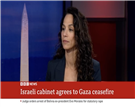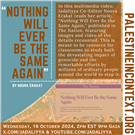On Tuesday September 21st, the Human Rights Council released an advance version of its report on the Independent Expert Commission created to assess the adequacy of Israeli and Palestinian domestic investigations of alleged war crimes committed during Operation Cast Lead pursuant to the UN Fact-Finding Mission recommendations, also known as the Goldstone Report. Oddly, while the 28-paged report finds that the domestic investigations fail to meet international standards of justice, it makes no recommendations intended to treat that shortcoming. The Committee’s report therefore adds to a string of damning documentation regarding the lack of accountability in the Israel-Palestinian conflict that dissipates like gas into air for lack of implementation teeth.
The Human Rights Council created the three-person expert Commission in June 2010 to assess whether the domestic investigations complied with international standards of justice, namely, independence, impartiality, effectiveness, thoroughness, and promptness. The Independent Experts, Mr. Christian Tomuschat, Judge Mary McGowan Davis, and Mr. Param Cumaramsawy, conducted their mission notwithstanding Israeli non-cooperation. In lieu of meeting with the Israeli investigatory team, they met with witnesses and human rights NGO’s in Gaza as well as in Jordan.
A few words on the investigations themselves. As I’ve written on Jadaliyya before, Israel’s domestic investigations are rife with conflicts of interest and a lack of oversight that render them inadequate mechanisms for accountability. In addition to the glaring examples of ludicrous findings, there are several structural issues worth mentioning. Chief among them is the fact that Israeli authorities have refused to investigate the whole operation, as mandated by international legal standards, choosing instead to only examine the conduct of individual soldiers. In doing so, Israeli authorities fail to investigate its command level policy-based decisions including, but not limited to, its rules of engagement as well as its use of excessively harmful weapons in lieu of lesser harmful alternatives, like white phosphorous.
Additionally, by placing primary responsibility on the Military Advocate General (MAG), who himself may be subject for criminal prosecution for providing legal counsel to the IDF during Operation Cast Lead, the Israeli investigation lacks independence and impartiality. From the outset, the MAG has affirmed that ‘[t]hroughout the fighting in Gaza, the IDF operated in accordance with international law,’ thereby absolving himself as well as the command level decision-makers of any wrong doing before the initiation of investigations.
Finally, Israel’s system is too heavily reliant on operational debriefings, which are not intended to provide effective judicial remedy to victims but instead to enhance military operations. During its Twelfth Session, the Human Rights Council recognized that “a tool designed for the review of performance and to learn lessons can hardly be effective and impartial investigation mechanism that should be instituted after every military operation where allegations of serious violations have been made.”
The report itself recognizes some of these structural shortcomings. In paragraphs 53 and 54, the Independent Experts determine that there is a lack of independence. Moreover, the Committee notes that the Israeli investigations were flawed for their abuse of the witnesses involved. Imagine that even in the aftermath of its devastating onslaught, Palestinians in Gaza still cooperated with Israel’s investigations and waited at the Erez crossing, one of Gaza’s five connections to the outside world sealed by Israel’s blockade since June 2007, to be interviewed. The Committee report found that someone from the Al Sammouni family waited for 13 hours to be interviewed and was refused access to sanitary facilities for hours--and when finally allowed to use a toilet was forced to do so in the presence of soldiers. In the Abed Rabbo case, the witness waited for 6 hours and was sent home without being interviewed. (See paragraph 59).
Nevertheless, the Committee concludes that it “cannot determine if Israel complied with international standards for an investigation because Israel refused to cooperate…” with its investigation. In a criminal trial, when someone is in contempt of court--they are placed in jail and yet here the Committee seems to be responding to Israel’s rebuff of its international mandate by relieving it of effective accountability mechanisms. Israel`s non-cooperation alone tarnishes the domestic efforts and leads one to conclude that a third-party should be involved and yet, the Commission fails to recommend that the Human Rights Council refer the findings in the Goldstone Report to the International Criminal Court, which was established in 1998 precisely to address such gross violations of international humanitarian law.,
The Committee’s lack of recommendations is more odd in light of several of its other findings. The Committee notes that Israel has initiated 150 investigations and has issued disciplinary action in only 4 cases, and has rendered a single criminal indictment in the case of a soldier using a credit card that did not belong to him. The Independent Experts acknowledge that they have no way of verifying the validity of Israel’s findings because they are denied full access to evidence and the reasoning behind these decisions. In Gaza, where 1,400 Palestinians were killed in a span of 22 days, at least one-third of whom were children, Israeli investigations should be deemed ineffective when the single criminal indictment rendered is for looting. At the very least these findings should raise a rebuttable presumption which Israel has the burden to disprove and failure to do so should result in a General Assembly resolution referring the case to the ICC.
The politics surrounding the process are overwhelming. Consider that while Israel willfully dismisses the Human Rights Council’s mandate, it is accepted as a member into the prestigious Organization for Economic Cooperation and Development (OECD). Meanwhile, Hamas, whom the Committee refers to as “Gaza’s de facto authorities,” appointed an investigatory body, which the Committee deems to make significant strides in meeting international standards for justice, is categorized as a terrorist organization and is excluded from its own peace talks. Perhaps most disappointing of all is the fact that the Fateh-led Palestinian Authority has taken more issue with the Committee’s recognition of Hamas’s investigation than it has with the Committee’s failure to recommend that the investigation be referred to the ICC. A colleague who has been attending the session in Geneva notes that the Palestinian representatives have been absent from these proceedings for the past two days leaving their seat woefully empty. In a program this morning on “Radio Palestine,” Ibrahim Khreishe, a senior Fateh member, laments this in particular and declares that because of Hamas, the PA could not fulfill its investigatory mandate and therefore cannot demand for compensation for the survivors and victims of Operation Cast Lead. Instead, according to Khreishe, the PA can do no more than urge Israel to meet its international obligations. It would seem that rather than build on this opportunity to achieve accountability for all Palestinians, the PA is using the investigation as another means to undermine Hamas in its ongoing struggle for ultimate power over occupied territories—little more than a string of Bantustans in the West Bank and an open air prison in Gaza.
The Committee of Independent Experts will be presenting its report to the Human Rights Council on September 27th—hopefully by then advocacy efforts in Geneva will bridge the gap between the Committee’s findings and the lack of recommendations to refer this to the ICC for an independent criminal investigation. In all cases, I hope that Phyllis Bennis’s observation today in her Huffington Post piece on Obama’s speech at the UN, that "`International law is not an empty promise`-except for Palestinians" does not ring true on the 27th. This is not only in the best interest of Palestinians but for the state of international law all together.
![[Richard Goldstone, image from buzzaboutpolitics.com]](https://kms.jadaliyya.com/Images/357x383xo/goldstone-091709.jpg)










